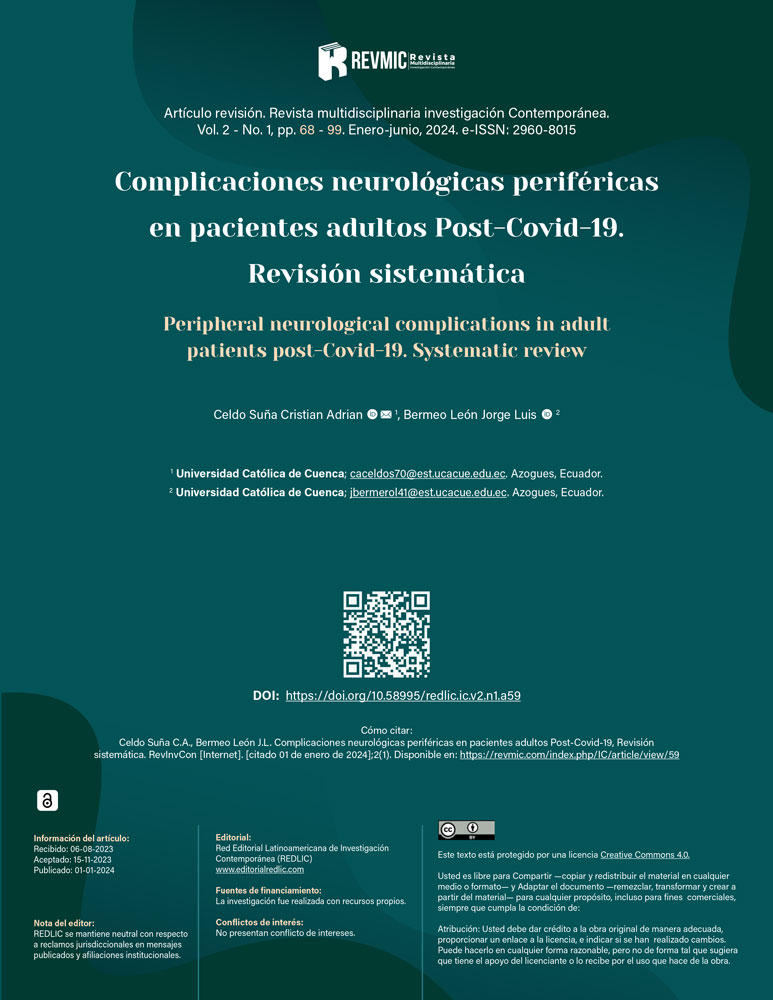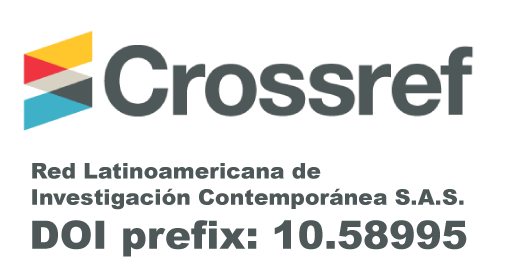Complicaciones neurológicas periféricas en pacientes adultos Post-Covid-19, Revisión sistemática
Resumen
Introducción: los cambios neurológicos posteriores al Covid-19 se producen por la migración del virus a través de terminaciones nerviosas, las alteraciones identificadas por exámenes de laboratorio, inmunoglobulinas, estudios de imagen, pruebas neurosensoriales individualizan cada trastorno neurológico según su gravedad. Objetivo: sistematizar datos científicos obtenidos en diferentes publicaciones que evalúen complicaciones neurológicas por Covid-19. Metodología: esta revisión sistemática empleo la guía PRISMA 2020 con criterios de inclusión de PEDro y Oxford, obtenidos de ELSEVIER, Wiley Online Library, PubMed, SciELO, Dialnet, Web of Science, Springer Link u otras revistas digitales usando AND, NOT, OR, u, o. Resultados: de un total de 156 artículos, 62 hacen referencia al sistema nervioso periférico, 33 (43%) corresponden anosmia y 23 (30%) a disgeusia, como las más frecuentes. Conclusiones: el tratamiento se utiliza específicamente para cada patología con una duración de semanas o meses asociado a rehabilitación farmacológica más fisioterapia.
Descargas
Referencias
- Liotta EM, Batra A, Clark JR, Shlobin NA, Hoffman SC, Orban ZS, et al. Frequent neurologic manifestations and encephalopathy-associated Covid-19. Ann Clin Transl Neurol [Internet]. 2020. https://doi.org/10.1002/ACN3.51210 Q1 DOI: https://doi.org/10.1002/acn3.51210
- Delgado C, Valles M, Delgado A, Yus M, Gómez N, Jorquera M, et al. Cognitive dysfunction associated with COVID-19. J Psychiatr Res [Internet]. 2022 https://doi.org/10.1016/j.jpsyc hires.2022.03.033 Q1
- Yus M, Matias JA, Gil L, Gómez N, Polidura C, Jorquera M, et al. Persistent olfactory dysfunction after COVID-19 is associated with reduced perfusion in the frontal lobe. Acta Neurol Scand [Internet]. 2022:194-198. https://doi.org/10.1111/ANE.13627 Q2 DOI: https://doi.org/10.1111/ane.13627
- Mao L, Jin H, Wang M, Hu Y, Chen S, He Q, et al. Neurologic Manifestations of Hospitalized Patients with Coronavirus Disease 2019 in Wuhan, China. JAMA Neurol. 2020.https://doi.org/10.1001/JAMANEUROL.2020.1127 Q1 DOI: https://doi.org/10.1001/jamaneurol.2020.1127
- Nalbandian A, Sehgal K, Gupta A, Madhavan M V., McGroder C, Stevens JS, et al. Post-acute COVID-19 syndrome. Nat Med 2021 274 [Internet].:601-615. https://doi.org/10.1038/s41591-021-01283-z PMID: 33753937 Q1 DOI: https://doi.org/10.1038/s41591-021-01283-z
- Gogia B, Gil A, Rai PK, Fang X. A case of COVID-19 with multiple cranial neuropathies.[cited 2022 Jul 27]. https://doi.org/10.1080/00207454.2020.1869001 Q3 DOI: https://doi.org/10.1080/00207454.2020.1869001
- Faghy A, Maden T, Arena R, Copeland R, Owen R, Hodgkins H, et al. COVID-19 patients require multi-disciplinary rehabilitation approaches to address persisting symptom,profiles.2022.https://doi.org/10.1080/17476348.2022.2063843 Q2 DOI: https://doi.org/10.1080/17476348.2022.2063843
- Arndal E, Lebech A, Podlekarava D, Mortensen J, Christensen J, Rönsholt F, et al. Olfactory and Gustatory Outcomes Including Health-Related Quality of Life 3-6 and 12 Months after COVID-19:JClinMed[Internet].2022Oct1.https://doi.org/10.3390/JCM11206025 Q2 DOI: https://doi.org/10.3390/jcm11206025
- Costa K, Carnaúba A, Rocha K, Andrade K, Ferreira , Menezes P. Olfactory and taste disorders in COVID-19: a systematic review. Braz J Otorhinolaryngol [Internet]. 2020 Nov1:781-792.https://doi.org/10.1016/J.BJORL.2020.05.008 Q2 DOI: https://doi.org/10.1016/j.bjorl.2020.05.008
- Touisserkani SK, Ayatollahi A. Oral Corticosteroid Relieves Post-COVID-19 Anosmia in a 35-Year-Old Patient. Case Rep Otolaryngol. 2020 Aug 8;2020:1-2. https://doi.org/10.1155/2020/5892047 Q2 DOI: https://doi.org/10.1155/2020/5892047
- Lechien J, Chiesa E, Siati D, Horoi M, Le B, Rodriguez A, et al. Olfactory and gustatory dysfunctions as a clinical presentation of mild-to-moderate(COVID-19): [Internet].2020Aug1:2251–61.https://doi.org/10.1007/S00405-020-05965-1 Q1 DOI: https://doi.org/10.1007/s00405-020-05965-1
- Premraj L, Kannapadi N V., Briggs J, Seal SM, Battaglini D, Fanning J, et al. Mid and long-term neurological and neuropsychiatric manifestations of post-COVID-19 syndrome: A meta-analysis. J Neurol Sci. 2022 Mar 15;434. PMID: 35121209 Q2 DOI: https://doi.org/10.1016/j.jns.2022.120162
- Anaya J, Rojas M, Salinas L, Rodríguez Y, Roa G, Lozano M, et al. Post-COVID syndrome. A case series and comprehensive review. Autoimmun Rev. 2021 Nov 1;20(11). https://doi.org/10.1016/J.AUTREV.2021.102947 Q1 DOI: https://doi.org/10.1016/j.autrev.2021.102947
- Huang C, Yeming M, Xingwang M, Lili R, Jianping Z, Yi M, et al. Clinical features of patients infected with 2019 novel coronavirus in Wuhan, China. Lancet (London, England) [Internet]. 2020Feb15:497-506.https://doi.org/10.1016/S0140-6736(20)30183-5 Q1 DOI: https://doi.org/10.1016/S0140-6736(20)30183-5
- Siddiqui R, Mungroo MR, Khan NA. SARS-CoV-2 invasion of the central nervous: a brief review. https://doi.org/101080/2154833120211887677 [Internet]. 2021 Aug 1;49(3):157-163 . https://doi.org/10.1080/21548331.2021.1887677 Q3 DOI: https://doi.org/10.1080/21548331.2021.1887677
- Augustin M, Schommers P, Stecher M, Dewald F, Gieselmann L, Gruell H, et al. Post-COVID syndrome in non-hospitalised patients with COVID-19: Lancet Reg Heal - Eur. 2021 Jul 1;6:100122. https://doi.org/10.1016/J.LANEPE.2021.100122 Q1 DOI: https://doi.org/10.1016/j.lanepe.2021.100122
- Jafari Z, Kolb B, Mohajerani M. Hearing L, Tinnitus, and Dizziness in COVID-19: Can J Neurol Sci [Internet]. 2022 Mar 12:184–95. https://doi.org/10.1017/CJN.2021.63 Q2 DOI: https://doi.org/10.1017/cjn.2021.63
- Mariños E, Espino P, Rodriguez L, Barreto E. Manifestaciones neurológicas asociadas a COVID-19 en el Hospital Edgardo Rebagliati Martins, Perú. Rev Neuropsiquiatr. 2021;83(4):243–56. https://doi.org/10.20453/rnp.v83i4.3890 Q4 DOI: https://doi.org/10.20453/rnp.v83i4.3890
- Viola P, Ralli M, Pisani D, Malanga D, Sculco D, Messina L, et al. Tinnitus and equilibrium disorders in COVID-19 patients: Eur Arch Oto-Rhino-Laryngology. 2021 Oct1:3725-3730.https://doi.org/10.1007/S00405-020-06440-7 Q1 DOI: https://doi.org/10.1007/s00405-020-06440-7
- Elibol E. Otolaryngological symptoms in Covid-19. Eur Arch Oto-Rhino-Laryngology [Internet].2021Apr:1233-1236.https://doi.org/10.1007/S00405-020-06319-7/TABLES/4 Q1 DOI: https://doi.org/10.1007/s00405-020-06319-7
- Sahu T, Mehta A, Ratre Y, Jaiswal A, Vishvakarma N, Bhaskar L, et al. Current understanding of the impact of COVID-19 on gastrointestinal disease: World J Gastroenterol [Internet]. 2021 Feb1:449–69.https://doi.org/10.3748/WJG.V27.I6.449 Q1 DOI: https://doi.org/10.3748/wjg.v27.i6.449
- Chen R, Wang K, Yu J, Howard D, French L, Chen Z, et al. The Spatial and Cell-Type Distribution of SARS-CoV-2 Receptor ACE2 in the Human and Mouse Brains. Front Neurol. 2021;11:0-3. https://doi.org/10.3389/fneur.2020.573095 Q2 DOI: https://doi.org/10.3389/fneur.2020.573095
- Koyama S, Kondo K, Ueha R, Kashiwadani H, Heinbockel T. Possible Use of Phytochemicals for Recovery from COVID-19-Induced Anosmia and Ageusia. Int J Mol Sci [Internet]. 2021 Aug 2;22(16): https://doi.org/10.3390/IJMS22168912 Q1 DOI: https://doi.org/10.3390/ijms22168912
- Ninchritz E, Soriano M, Mayo M, Calvo C, Martínez P, Saga C, et al. Evaluación subjetiva de las alteraciones del olfato y del gusto: Med Clin (Barc) [Internet]. 2021 Jan 22:61-64. https://doi.org/10.1016/J.MEDCLI.2020.08.004 Q3 DOI: https://doi.org/10.1016/j.medcli.2020.08.004
- Sepúlveda V, Waissbluth S, González C. Anosmia y enfermedad por Coronavirus 2019 (COVID-19): Rev Otorrinolaringol y cirugía cabeza [Internet]. 2020:247-258. Q3 DOI: https://doi.org/10.4067/S0718-48162020000200247
- Abdelalim A, Mohamady A, Elsayed R, Elawady M, Ghallab A. Corticosteroid nasal spray for recovery of smell sensation in COVID-19 patients:. Am J Otolaryngol - Head Neck Med Surg. 2021 Mar 1. https://doi.org/10.1016/J.AMJOTO.2020.102884 Q1 DOI: https://doi.org/10.1016/j.amjoto.2020.102884
- Rashid R, Zgair A, Al-Ani, Effect of nasal corticosteroid in the treatment of anosmia due to COVID-19: Am J Otolaryngol [Internet]. 2021 Sep 1 ;42(5): https://doi.org/10.1016/J.A MJOTO.2021.103033 Q1 DOI: https://doi.org/10.1016/j.amjoto.2021.103033
- Carrasco A, Vinitzky I, Román C, Vélez A, Morales V, Fernández R, et al. Disgeusia como principal manifestación oral en pacientes con COVID-19 Respiratorias. Odontol Sanmarquina. 2022;25(1):e22064.https://doi.org/10.15381/os.v25i1.22064 Q3 DOI: https://doi.org/10.15381/os.v25i1.22064
- Brola W, Wilski M. Neurological consequences of COVID-19. Pharmacol Reports 2022 746 [Internet].2022Sep30:1208-1222.https://doi.org/10.1007/S43440-022-00424-6 Q3 DOI: https://doi.org/10.1007/s43440-022-00424-6
- Heckmann S, Hujoel P, Habiger S, Friess W, Wichmann M, Heckmann J, et al. Zinc gluconate in the treatment of dysgeusia. J Dent Res. 2020 Jan 25:35–8. https://doi.org/10.1177/154405910508400105 Q3 DOI: https://doi.org/10.1177/154405910508400105
- Chen L, Deng C, Chen X, Zhang X, Chen B, Yu H, et al. Ocular manifestations and clinical characteristics of 535 cases of COVID-19 in Wuhan, China: Acta Ophthalmol. 2020 Dec 1:e951-e959 . https://doi.org/10.1111/AOS.14472 PMID: 32421258 Q1 DOI: https://doi.org/10.1111/aos.14472
- Babaei M, Bayani M, Farzin M, Rasoulinejad S. The Association of Clinical Symptoms and Clinical Conditions with Ophthalmic Manifesting in COVID-19 Patients. Casp J Intern Med. 2022:180-186.https://doi.org/10.22088/CJIM.13.0.180 Q3
- Shaikh N, Al Mahdi H, Pai A, Pathare A, Abujaber A, Dsliva A, et al. Ocular manifestations of COVID-19: facts and figures from a tertiary care center. Ann Med. 2022:310-313. https://doi.org/10.1080/07853890.2022.2029554 Q1 DOI: https://doi.org/10.1080/07853890.2022.2029554
- Ly-Yang F, Gómez V, Pérez P, González N, Porta J, Santos E. Fotofobia intercrítica en el paciente migrañoso. Propuesta de criterios diagnósticos. Neurología [Internet] .2021Feb13;348-390https://doi.org/10.1016/J.NRL.2020.12.004 Q3 DOI: https://doi.org/10.1016/j.nrl.2020.12.004
- Llorente B, López A, Sánchez R, Gutiérrez C. Protocolo diagnóstico de las manifestaciones crónicas de la COVID-19. Med - Programa Form Médica Contin Acreditado. 2022:3256-3260. https://doi.org/10.1016/j.med.2022.05.007 Q2 DOI: https://doi.org/10.1016/j.med.2022.05.007
- Bouza E, Moreno R, Ramos L, GarcíaA, García A, Gómez J, et al. Post-covid syndrome: A reflection and opinion paper. Rev Esp Quimioter. 2021:269-279. https://doi.org/10.37201/req/023.2021 Q3 DOI: https://doi.org/10.37201/req/023.2021
- Pardhan S, Vaughan M, Zhang J, Smith L, Chichger H. Sore eyes as the most significant ocular symptom experienced by people with COVID-19:BMJ Open Ophthalmol. 2020 Nov 30;5(1). https://doi.org/10.1136/BMJOPHTH-2020-000632 Q1 DOI: https://doi.org/10.1136/bmjophth-2020-000632
- Chern A, Famuyide O, Moonis G, Lalwani K. Sudden Sensorineural Hearing Loss and Covid-19.Otol Neurotol.2021:319-332.https://doi.org/10.1097/mao.0000000000003233 Q2 DOI: https://doi.org/10.1097/MAO.0000000000003233
- Joshua T, Ayub A, Wijesinghe P, Nunez D. Hyperbaric Oxygen Therapy for Patients With Sudden Sensorineural Hearing Loss: JAMA Otolaryngol Head Neck Surg [Internet]. 2022 Jan 1:5-11 Q2. https://doi.org/10.1001/JAMAOTO.2021.2685 Q1 DOI: https://doi.org/10.1001/jamaoto.2021.2685
- Vargas N, Trujillo R, Rodríguez F, Franco R, Martínez-Wbaldo M del C, Jiménez A, et al. Hipoacusia en pacientes con y sin COVID-19 antes y después de la recuperación de los casos positivos. Rev ORL [Internet]. 2022 Apr 4:9-18 https://doi.org/10.14201/ORL.27448 Q2 DOI: https://doi.org/10.14201/orl.27448
- Gold D, Galetta S. Neuro-ophthalmologic complications of coronavirus disease 2019 (COVID-19). Neurosci Lett [Int ernet]. 2021 Jan 18;742.https://doi.org/10.10 16/J.NEULET.2020.135531 Q2 DOI: https://doi.org/10.1016/j.neulet.2020.135531
- Beukes E, Ulep A, Eubank T, Manchaiah V. The impact of covid-19 and the pandemic on tinnitus: J Clin Med. 2021;10(13):https://doi.org/10.3390/jcm10132763 Q3 DOI: https://doi.org/10.3390/jcm10132763
- Kartal A, Kılıç M. Tinnitus in patients recovering after COVID-19: observational and cross-sectional study. Eur Arch Oto-Rhino-Laryngology [Internet]. 2022 Jul 6;1-8. https://doi.org/10.1007/S00405-022-07501-9/METRICS Q1 DOI: https://doi.org/10.1007/s00405-022-07501-9
- Peramo P, López M, López M. Secuelas médicas de la COVID-19. Med Clin (Barc) [Internet]. 2021 Oct;157(8):388-394.https://doi.org/10.1016/j.medcli.2021.04.023 Q3 DOI: https://doi.org/10.1016/j.medcli.2021.04.023
- Almishaal A. Comparative Study of Audiovestibular Symptoms between Early and Late Variants of COVID-19. Audiol Res [Internet]. 2022 Dec 1;12(6):680-695. https://doi.org/10.3390/AUDIOLRES12060065 Q4 DOI: https://doi.org/10.3390/audiolres12060065
- Škunca J, Marić G, Ravlić M, Knežević L, Jerković I, Sušić E, et al. Diplopia, COVID-19: Results from a Cross-Sectional Study in Croatia. 2022;10(9):1-9. https://doi.o rg/10.3390/vaccines10091558 Q1 DOI: https://doi.org/10.3390/vaccines10091558
- García J, Balaguer R, Dolores M, Ruescas L. COVID-19 resource centre with information.Otorrinolaringol.2020(January):21.https://doi.org/10.1016/j.otorri.2021.07.001 Q2 DOI: https://doi.org/10.1016/j.otorri.2021.07.001
- Islamoglu Y, Celik B, Kiris M. Facial paralysis as the only symptom of COVID-19: Am J Otolaryngol . 2021 Jul 1;42(4). https://doi.org/10.1016/J.AMJOTO.2021.102956 Q1 DOI: https://doi.org/10.1016/j.amjoto.2021.102956
- Berry MD, Berry PD. Contemporary treatment of sexual dysfunction: reexamining the biopsychosocial model. J Sex Med [Internet]. 2023 Feb 22;10(11):2627-2643. https://doi.org/10.1111/JSM.12273 Q1 DOI: https://doi.org/10.1111/jsm.12273
- AlvaC, Mori N, Pacheco K, Velásquez V, Rivera O, Huerta A, et al. Guía de práctica clínica para el diagnóstico y tratamiento del paciente con SGB. Neurol Argentina [Internet]. 2020 Jan 1;12(1):36-48.https://doi.org/10.1016/J.NEUARG.2019.09.006 Q4 DOI: https://doi.org/10.1016/j.neuarg.2019.09.006
- Wijdicks M, Klein C. Guillain-Barré Syndrome. Mayo Clin Proc. 2017 Mar 1;92(3):467-479. https://doi.org/10.1016/J.MAYOCP.2016.12.002 Q1 DOI: https://doi.org/10.1016/j.mayocp.2016.12.002
- Guardia MP, Ramírez M, Avilés A, Navarrete I, Rojas A, Mancisidor M. Resultados tras el seguimiento a largo plazo de los pacientes evaluados en una unidad de síncope. Cardiocore [Internet].2019Oct:182-186https://doi.org/10.1016/J.CARCOR.2018.07.003 Q4 DOI: https://doi.org/10.1016/j.carcor.2018.07.003
- Oates C, Turagam M, Musikantow D, Chu E, Shivamurthy P, Lampert J, et al. Syncope and presyncope in patients with COVID-19. Pacing Clin Electrophysiol [Internet].2020Oct1;43(10):1139-1148.https://doi.org/10.1111/PACE.14047 Q2 DOI: https://doi.org/10.1111/pace.14047
- Zhang X, Ye L, Huang Y, Ding X, The WL, Omar S, et al. Since January 2020 Elsevier has created a COVID-19 resource centre with free information in English and Mandarin on the novel coronavirus COVID- 19 . 2020;(January) PMID: 33276180 Q3
- Aldè M, Barozzi S, Di Berardino F, Zuccotti G, Consonni D, Ambrosetti U, et al. Prevalence of symptoms in 1512 COVID-19 patients: Intern Emerg Med [Internet]. 2022 Aug 1:1343-1353. https://doi.org/10.1007/S11739-022-02930-0 Q2 DOI: https://doi.org/10.1007/s11739-022-02930-0
- Daker L, Elshafei R, Bahi M, Mohammed A, Erfan R, Gomaa M. Could vertigo be a post-COVID-19 ;J Neurol psychiatry Neurosurg [Internet]. 2023 Dec 1 [cited 2023 Jul 16];59(1). https://doi.org/10.1186/S41983-023-00659-X Q3 DOI: https://doi.org/10.1186/s41983-023-00659-x
- Kim C, Jeong H, Shin J. Incidence of idiopathic benign paroxysmal positional vertigo subtype by hospital visit type: experience of a single tertiary referral centre. J Laryngol Otol [Internet]. 2023 Jan 16:57-60.https://doi.org/10.1017/S0022215121003923 Q1 DOI: https://doi.org/10.1017/S0022215121003923
- José F, González J, Molina J, Arnau L, Iribarren I, Jabaloyas J, et al. Infección por SARS-CoV-2: implicaciones para la salud sexual y reproductiva. Rev Int Androl [Internet]. 2020 Jul 1;18(3):117. https://doi.org/10.1016/J.ANDROL.2020.06.001 Q3 DOI: https://doi.org/10.1016/j.androl.2020.06.001
- Garcia A, Collado D, Olivares R, Adsuar C. Aplicación del cuestionario EQ-5D-5L en pacientes que padecen incontinencia urinaria. Actas Urol Esp. 2016 Sep 1;40(7):457–62. https://doi.org/10.1016/j.acuro.2016.01.010 Q3 DOI: https://doi.org/10.1016/j.acuro.2016.01.010
- Patiño A, Sanchez C, Iregui D, Fernández N. Guía vejiga hiperactiva no neurogénica en adultos. Urol Colomb [Internet]. 2016 Jan 1: 25(1):62.e1-62.e15. https://doi.org/10.1016/J.UROCO.2016.02.004 Q4 DOI: https://doi.org/10.1016/j.uroco.2016.02.004
- Emordi V, Lo A, Bisharat M, Malakounides G. COVID-19-Bladder and Bowel Inco ntinence:Clin(Phila)[Internet].2023Aug4;https://doi.org/10.1177/00099228231167844 Q2 DOI: https://doi.org/10.1177/00099228231167844
- Araujo M, Brito L, Pochini A, Ejnisman B, Sartori M, Girão M. Prevalence of Urinary Incontinence in CrossFit Practitioners before and during the COVID-19: Rev Bras Ginecol Obstet[Internet].2021Nov143(11):847-852.https://doi.org/10.1055/S-0041-1739463 Q2 DOI: https://doi.org/10.1055/s-0041-1739463
- Herrero A, Parra J, Diaz T, Arias M, Muñoz J, del Yerro J, et al. Sleep characteristics in health workers exposed to the COVID-19 pandemic. Sleep Med. 2020 Nov 1;75:388-394. https://doi.org/10.1016/J.SLEEP.2020.08.013 Q1 DOI: https://doi.org/10.1016/j.sleep.2020.08.013
- Tedjasukmana R, Budikayanti A, Islamiyah WR, Witjaksono L, Hakim M. Sleep disturbance in post COVID-19 conditions: Front Neurol [Internet]. 2023 Jan 9;13: https://doi.org/10.3389/FNEUR.2022.1095606 Q2 DOI: https://doi.org/10.3389/fneur.2022.1095606
- Kennedy M, Helfand I, Gou R, Gartaganis S, Webb M, Moccia J, et al. Delirium in Older Patients With COVID-19:JAMA Netw open [Internet].2020 Nov 19;3(11):19. https://doi.org/10.1001/JAMA NETWORKOPEN.2020.29540 Q2 DOI: https://doi.org/10.1001/jamanetworkopen.2020.29540

Publicado 2024-01-01
Palabras clave
- Covid-19,
- anosmia,
- Post Covid-19,
- Covid-19 prolongado,
- SARS
- disgeusia,
- SARS-COV2,
- Covid-19 de largo plazo,
- manifestaciones neurológicas ...Más
Número
Sección
Derechos de autor 2023 Revista Multidisciplinaria Investigación Contemporánea

Esta obra está bajo una licencia internacional Creative Commons Atribución-NoComercial-CompartirIgual 4.0.



















